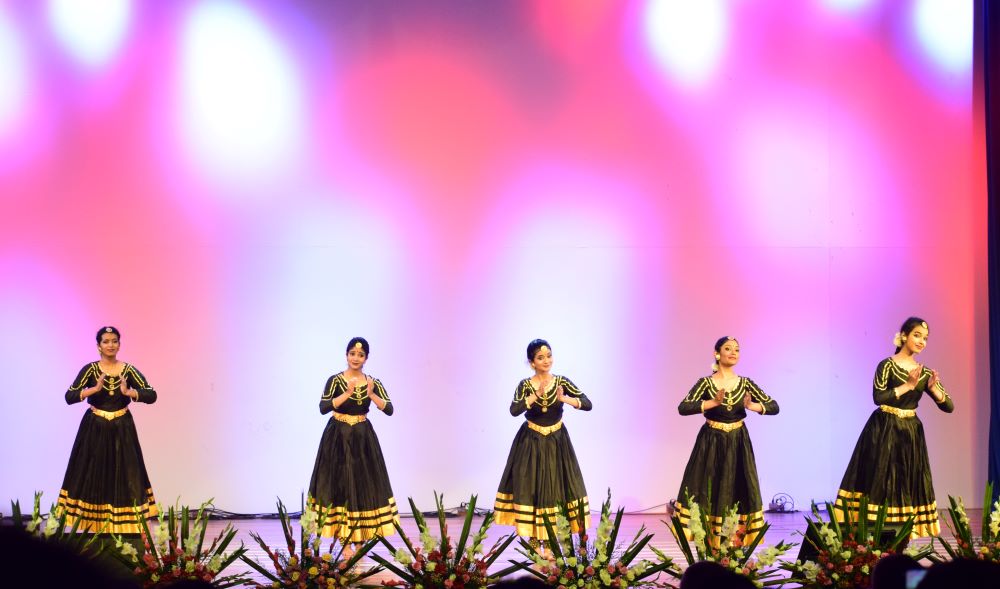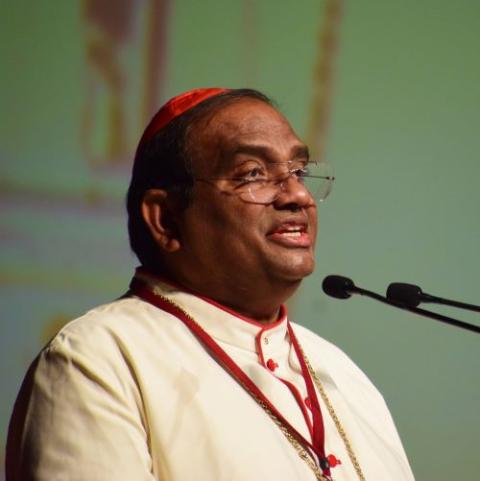Xavières Sr. Nathalie Becquart, an undersecretary for the Vatican's synod office, lights a candle during an opening lamp-lighting ceremony for the "Towards a Synodal Church: Moving Forward" conference at Dharmaram Vidya Kshetram. (Courtesy of Joji Johnson)
The incredibly beautiful campus of the Dharmaram Vidya Kshetram, a pontifical athenaeum for higher learning and formation in Bengaluru (Bangalore), India, hosted an important conference Jan. 12-15 about Pope Francis' ongoing three-year synod process.
Roughly 250 international participants from more than 30 countries joined another 250 graduate students from the athenaeum to consider the theme "Towards a Synodal Church: Moving Forward."
The conference signaled that the process of synodality — of the global church "walking together," as Francis has called for — is very much underway. And participants benefited from discussing the pope's vision and process in a very different location, with a range of representatives from universities across the world to report on how synodality is emerging, slowly but surely, in a variety of places.
A new kind of host
Participants could not miss the distinctive Indian context at the Bangalore conference. The first Indigenous religious congregation in India's Catholic Church, the Congregation of the Carmelites of Mary Immaculate, which founded the athenaeum, hosted the event.
The hospitality was incredible and the conference and all its operations were the brainchild of their moral theologian, Carmelite Fr. Shaji George Kochuthara, who since hosting a conference at the athenaeum in 2013 to celebrate the 50th anniversary of the Second Vatican Council has also hosted international conferences on Francis' 2016 exhortation Amoris Laetitia and his 2020 encyclical Fratelli Tutti.
The recent conference opened with gorgeous Indian meditative dance followed by a lamp lighting ceremony. Every day began with a different liturgy from the Syro-Malabar, Syro-Malankara and Latin rites; each was presided over by a well-known member of the Indian hierarchy. The differing synodalities of the respective rites also emerged in the eighth of our 10 plenaries, in which members of the different rites spoke about synodality in their traditions.
The first speaker at the conference was Cardinal Anthony Poola, archbishop of Hyderabad, the Catholic Church's first cardinal from India's Dalit caste, formerly known as "untouchables."
Poola prophetically highlighted three disturbing trends in Indian society: differentiation, demonization and distortion. He called for these vices to be uprooted to let synodality emerge. He forecasted: "The synod shall not end as a romance." And prayed, "May it hurt us. From the sugarcoating, let us move to bitter medicine."
His was the first indicator of the heft and depth of contemporary Indian theology, repeatedly made evident — whether by the wit and charm of Tellicherry Archbishop Joseph Pamplany, who closed the conference, or the wise words by the athenaeum president, Carmelite Fr. Joy Philip Kakkanattu, who offered biblical perspectives on synodality. In fact, one of the finest of the 30 plenary papers was from Carmelite Fr. Jeff Shawn Jose, who invoked Charles Taylor and José Casanova as resources for advancing synodality.
Like the content, the style of the conference was Indian, too. Venezuelan theologian Rafael Luciani, who teaches at Boston College, told me, "The conference took place in an atmosphere that combined the presentation of papers with group dialogues and daily prayer. All this facilitated an environment in which we were able to learn from each other."
Luciani added: "The diversity of the speakers allowed for an intercultural and intercontinental dialogue, which did not limit the theological reflection to the Asian context, but sought to build bridges with the ecclesial and theological experience of other regions."
Xavier Montecel, from St. Mary's University in San Antonio, also told me: "Rarely do American theologians have the chance to be reminded that the church is global and that our work must be global as well. I have a much wider theological and professional imagination because I was there."
In India, now the most populated country in the world, about 2.6 percent of the population is Christian (nearly evenly divided between Protestants and Catholics), though Christians provide more than 25 percent of the country's institutional education, health and social services, according to Jesuit Fr. John Chathanatt's 2015 book on the Indian Catholic Church, Silent Waves.
No one doubts the Christian presence in India nor its formidable role in securing the future of India.
This was clear to us where many of us stayed, at the elegant guest house of Christ (Deemed to be University) in Bangalore, another Carmelites of Mary Immaculate apostolate with 32,000 students and six campuses, and the top ranked computer science department in the country.
India's own confidence in its future provided a way of giving the rest of us at the conference confidence in the future of synodality.
Universities from across the globe
Xavières Sr. Nathalie Becquart, an undersecretary for the Vatican's synod office, was the conference's "guest of honor" and the first plenary speaker after Poola's opener. She provided us with a pilgrim spirituality of synodality that leads us onto a pathway where no one is to be left behind.
Becquart underlined the synods' appeal to universities as announced in the working document for the next phase of the three-year synod process, which was released in October.
There we find:
A special case in point is represented by universities and academic institutions, which will be able to develop research addressing questions of synodality, helping to innovate in the design of educational and formation programs. In particular, theological faculties will be able to deepen the ecclesiological, Christological and Pneumatological insights that synodal experiences and practices bring.
No apostolic structure was more in evidence at the conference than the Catholic universities.
Among the 14 "event partners," 11 were universities: Boston College; Christ (Deemed to be University) in Bangalore; Durham University in the U.K.; Hekima University College in Nairobi, Kenya; Jnana Deepa in Pune, India; Katholieke Universiteit Leuven in Belgium; University of Malta; the Universität Osnabrück in Germany; Spiritan University College in Kumasi, Ghana; Tilburg University in the Netherlands; and, the University of Tübingen in Germany.
Almost all presenters came from universities. Indeed, from the Americas alone, representatives hailed from Alberto Hurtado University in Santiago, Chile; Universidad Católica Andrés Bello in Caracas, Venezuela; Gonzaga University in Spokane, Washington; the Iberoamericana University in Mexico City, the Pontifical Javierian University in Bogotá, Colombia; St Mary's University in San Antonio, Texas; Villanova University in Philadelphia; and Boston College.
'The synod shall not end as a romance. … May it hurt us. From the sugarcoating, let us move to bitter medicine.'
— Cardinal Anthony Poola
From Asia participants came from Fu Jen Catholic University in Taiwan; Sancta Maria in Sri Lanka; the University of Santo Tomas in the Philippines; and Sogang University in South Korea.
As Luciani noted, "All this represented an important effort to integrate the work being done by the general secretariat of the synod with the theological and interdisciplinary reflection on synodality that is being developed in Catholic universities around the world."
Synodality taking root
Moving forward was very much the dynamic theme of the conference. As Kochuthara noted: "It was an occasion to experience the desire and determination to move forward towards a more synodal church, in spite of the differences and diversity of contexts."
He added: "The conference offered the possibility of dialogue between different contexts, leading to knowing each other better. For example, many from the West said that they never imagined that women from India and other Asian countries felt so strongly about their role in the church and were so courageous to express their feelings, including their criticism about the actual situation in the church."

A meditative dance opens the "Towards a Synodal Church: Moving Forward" conference at Dharmaram Vidya Kshetram, a pontifical athenaeum for higher learning and formation in Bengaluru, India. (Courtesy of Joji Johnson)
Though the conference was visionary in its promotion of synodality, it was equally realistic. For instance, the issue of "hierarchicalism" was raised specifically as antithetical to synodality, citing instances where bishops were outright opponents of the synodal pathways or, worse, gave the semblance of hosting synods when actually they did nothing more than control its process and outcomes.
Recognizing the problem of contemporary episcopal leadership, systematic, canonical and moral theologians offered their strategies for moving forward.
Women, across the disciplines, were the constant source of hope at the conference.
Astrid Lobo Gajiwala, an Indian medical doctor and scientist who has been a consultor to the Indian bishops' conference, advocated her "ministry of irritation" through which she unabashedly advocates for abuse survivors and women's ordination. Villanova University theologian Jaisy Joseph noted "the feminist consciousness of the large number of Indian religious sisters who were present" and "was encouraged by the progressive mindset of these women in their varying leadership roles within the Indian Catholic Church."
Advertisement
Indeed, like them, other women such as Maria Cimperman, Jutta Battenberg, Maria Isabel Espinosa, Myriam Wijlens, Serena Noceti, Christina Kheng, Teresa Choi, Estella Padilla, and Helen Saldanha offered the more critical and concrete assessments of both the challenges to and promise of synodality.
More than once, reference was made to the Upper Room where Jesus gathered the disciples and instructed them in humble hospitality as he washed their feet and shared the bread and cup. After the death of Jesus, they knew to return there with their fear and grief, where they in turn finally learned to listen to one another as they shared their new situation, until finally the Spirit led them out of the room to evangelize.
The conference closed reminding the participants that they had been in an upper room for four days, grieving the church and the world, but also learning to listen to one another to lead others forward on the synodal pathway.









